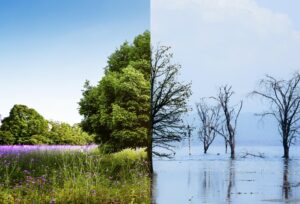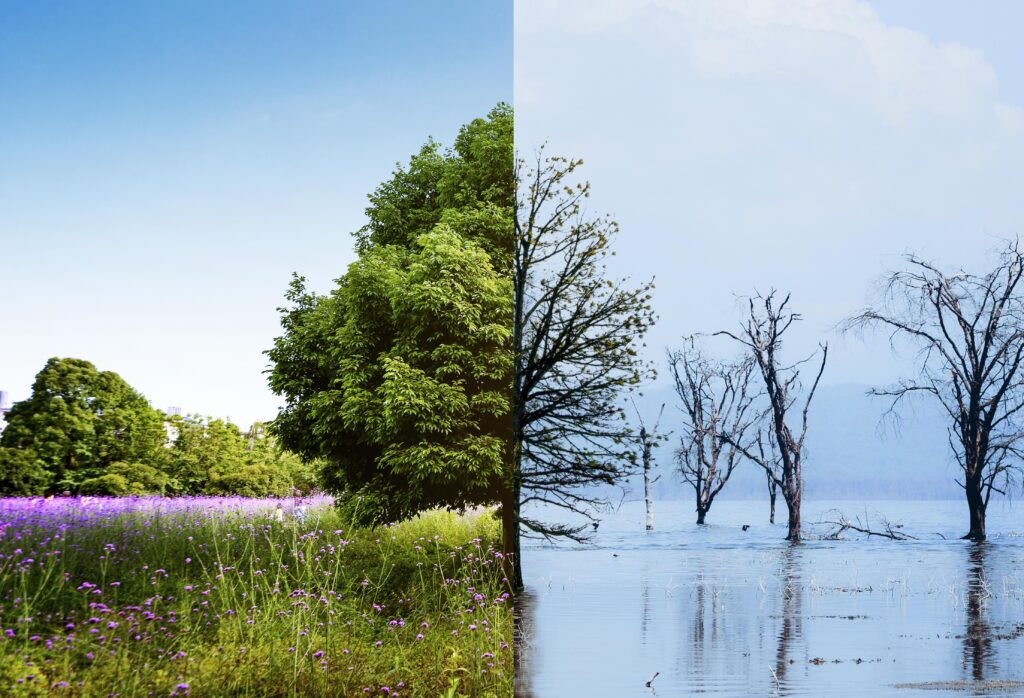
What is Climate Change?
Chances are, if you’ve come to VoteClimate, you’re concerned about climate change – also referred to as ‘climate breakdown’ or the ‘climate crisis’.
But maybe you want to explain climate change to your friends, family or your colleagues – and you’re looking for a really simple definition and a basic explanation you can share with others.
If you find this ‘What is climate change?’ explainer useful, please share it using the social media buttons above, or copy and paste this link: URL

Tell Labour they can win votes by prioritising climate action – Pledge to put climate first at the next election. Make the pledge and we’ll tell you when and how to cast the strongest tactical vote for climate in national and local elections.
First, let’s start with the basics. What’s the difference between weather and climate?
For example, where you are today, it could be warm and sunny, raining or even snowing. This is the weather.
In the UK, we tend to have cool, wet winters and mild summers. This is the UK’s climate. Occasionally, extreme weather occurs – like a prolonged spell of sub-zero temperatures in the winter, or summer days when the temperature exceeds 35C. But in general, the climate is easy to predict.
All over the world, climate change is making extreme weather more common – and the climate less predictable. So what is climate change?
Let’s start with a simple definition. Climate change is a big long-term shift in the Earth’s average weather patterns. That means changes in things like temperature, rainfall and wind. It can have big knock-on effects, causing more frequent and intense extreme weather, from storms and hurricanes to heatwaves.
The climate change we are seeing all around us today is caused by human activity – we’ll get into why later on in this post.
For an overview of climate change, take a look at this video from the Met Office:
Climate change takes place over many years – decades and centuries, not just a few years. It is different to natural variations in the weather – like a particularly hot summer or wet winter. When the climate changes, weather patterns gradually shift. Weather that was previously rare may become common – for example, summer days over 30C in the UK.
The climate has always changed naturally, but today, the climate is changing very quickly and dramatically. Globally, the Earth’s surface is getting hotter – in fact, global average temperatures have risen by 1.25C over the last two centuries or so.
As well as warmer temperatures overall, climate change is causing extreme weather which is harder to predict. You can see it in the news – each year, we hear more and more about wildfires in the US and Australia, extreme heat in Europe and Asia, and exceptionally dry conditions in the Horn of Africa. Or maybe you remember the record-breaking heat when the UK smashed through 40C in July 2022 – the highest temperature ever recorded in this country!
Today’s rapid changes are caused by human activity. In the next section, we look at how people are causing this dangerous climate change.
The climate has always changed due to a range of factors. But, as we mentioned earlier, the climate change we are experiencing at the moment is caused by human activity.
Gases such as carbon dioxide, methane and nitrous oxide are known as greenhouse gases because they cause the greenhouse effect. They form a layer around the Earth, trapping infrared radiation from the sun’s rays in the atmosphere and heating the surface of the planet – a bit like a greenhouse. It is normal for there to be some of these gases in the atmosphere. The greenhouse effect keeps the planet warm and makes it habitable to life.
Today, however, humans are causing unsafe levels of greenhouse gases to enter the atmosphere, mainly by burning fossil fuels. This is causing the planet to heat up fast, a process we call global warming (or ‘global heating’).
Since the industrial revolution, we have been burning huge amounts of fossil fuels such as coal, oil and gas to power our society. Burning these substances produces greenhouse gases such as carbon dioxide, methane and nitrous oxide. Carbon dioxide in particular stays in the atmosphere for a very long time. As a result of this, the climate is getting hotter and hotter.
Other human activities which contribute to climate change include:
Since the Industrial Revolution, which started 200 years ago, the planet has warmed by around 1.25C on average. This doesn’t sound like much, but scientists warn that temperature rises of 1.5C or more above pre-industrial levels could be catastrophic.
Climate change is happening very fast, at a rate not seen for 10,000 years – too fast for humans, and many plants and animals, to adapt to. At 1.25C of warming, we are already seeing many disastrous impacts of climate change, including:
It is difficult to say that any one natural disaster is caused by climate change. However, we can safely say that events such as these have become more frequent and more severe as a result of climate change. They will continue to happen more often with greater intensity as long as temperatures continue to rise.
The only way to stop the extreme weather getting worse is to stop emitting greenhouse gases and get temperature rises under control (jump to ‘What is being done to stop climate change?’ to learn more about what is needed).
2024 was the first calendar year when global average temperatures were more than 1.5C above pre-industrial levels – a very worrying threshold to cross. Using current methods, it will be many years – possibly decades – before we can say with certainty that humanity has passed 1.5C. At the moment, official estimates put temperature rises at around 1.25C.
However, a definitive UN report published in 2022, said that policies at the time would see temperatures rise to between 2.1C and a catastrophic 3C above pre-industrial levels. This well exceeds the ambition of limiting global average temperature rises to 1.5C agreed by world leaders in 2015.
According to another UN report, the difference in impacts between 1.5C and just 2C of warming are stark:
You may have heard some people say that climate change isn’t real, or that it’s happening but it isn’t caused by humans. That is not true. Almost all scientists agree that climate change is happening and that it is predominantly caused by humans.
Scientists have different forms of evidence that the planet is warming:
As we discussed above, the amount of carbon dioxide and the other greenhouse gases which keep the planet warm have increased since the onset of the industrial revolution about 200 years ago.
In fact, direct measurements of carbon dioxide in the atmosphere and trapped in ice show that this particular greenhouse gas has increased by 40% between 1800 and 2019. A fall in the proportion of other types of carbon, and a small drop in the concentration of oxygen in the atmosphere, tells scientists that this increase is due to the burning of fossil fuels. Have a look at this guide from the Royal Society for a more detailed scientific explanation.
In 2015, world leaders agreed to limit global average temperature rises to 2C, and if possible to 1.5C. This agreement took place at that year’s COP climate conference, which took place that year in Paris. The deal is often referred to as the ‘Paris agreement’.
Since then, emissions have continued to rise. However, many governments have made policies to limit their emissions. Most of these policies are linked to how we produce our energy – moving away from polluting fossil fuels and towards renewable sources, such as solar, wind and tidal. This is called ‘decarbonisation’.
There is a political consensus that the world needs to reach net zero emissions by 2050. ‘Net’ zero means that, on balance, emissions are at zero – any emissions that we do produce must be cancelled out somehow (for example, by being absorbed by trees). According to the International Energy Agency, achieving global net zero would give us a 50% chance of keeping temperature rises to within 1.5C of pre-industrial levels over the long term – so by no means a dead cert.
In 2019, the UK passed a law committing it to reach net zero by 2050. Developed countries like the UK kickstarted the industrial revolution, burning fossil fuels relatively early. Some people think it would be fairer for these countries to decarbonise more quickly to give developing countries more time. However, the policies of the UK’s current Labour government – although a step forward compared with the previous Conservative administration – are not enough to meet the UK’s legal requirement to reach net zero by 2050, let alone go further than this.
Another aspect is the carbon budget. UN scientists have calculated the amount of carbon dioxide the world can burn while still having a chance of limiting temperature rises to 1.5C. The UK has a share of this carbon budget, which it needs to stay within to do its bit.
With the government’s current set of policies, we have calculated that the UK will exceed its carbon budget around 2033. And this is with a generous carbon budget for the UK. We have simply split the global budget proportionally, rather than taking into account the UK’s historic responsibility for climate change through its role at the forefront of the industrial revolution.
There are lots of things you can do – from switching to a plant-based diet to giving up flying. There are many good reasons to take individual steps to reduce our emissions. However, what we do as individuals is a drop in the ocean. What we really need is government action.
There are lots of things you can do – from switching to a plant-based diet to giving up flying. There are many good reasons to take individual steps to reduce our emissions. However, what we do as individuals is a drop in the ocean. What we really need is government action.
At VoteClimate, we want to show the Labour government that it can win votes in future elections by adopting better climate policies. You can pledge to put climate first at the next election – if enough people make this pledge, we can show Labour that voters want climate action. And when you sign up, we’ll tell you when and how to cast the strongest tactical vote for climate in national and local elections.
See the latest news & updates from VoteClimate.

Chances are, if you’ve come to VoteClimate, you’re concerned about climate change – also referred to as ‘climate breakdown’ or the ‘climate crisis’.

The phrase ‘net zero’ gets bandied around a lot these days – you’ll often hear it on the lips of politicians left, right and centre.